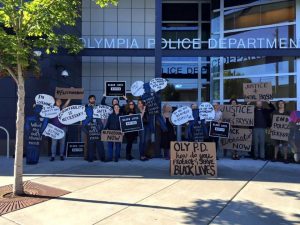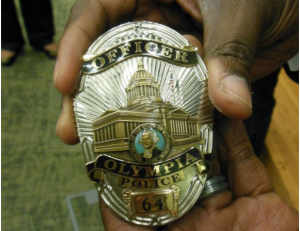How far have we come?
Nearly a year ago, George Floyd was murdered by Minneapolis policeman Derek Chauvin during an arrest, after a store clerk alleged that Floyd had passed a counterfeit $20 bill. The obscenely violent act of kneeling on Floyd’s neck for over nine minutes, killing him—seen and known about only because one young bystander caught it all by video on her phone—ignited a nation into action. Racism and police brutality in America are not new, they have long been an integral part of our history.

The jury’s guilty-on-all counts verdict delivered accountability to Derek Chauvin, but not true justice for George Floyd, much less for the countless people of color whose deaths, torture and victimization from police violence have seen zero accountability. Real justice for Floyd and too many others can only happen when we build a nation that fundamentally respects the equal dignity of every person.
How far have we come on that front in a year?
There’s no doubt that these real images of heinous police acts move citizens to action, not unlike how devastating images of the Vietnam War drew a nation into the streets to stop it. But meaningful change in an entrenched racist system is met at every juncture with more police violence, slow-moving or inactive City Councils, powerful opposition by police unions, and even disagreement amongst citizens about what changes should occur.
There is an ongoing, gargantuan effort to make change, mainly by committed people of color and their allies.
The Black Lives Matter movement is alive and well here, yet the pace of reform is slow:
- Street protests continue and so does the police violence upon them. Olympia City Council banned using tear gas for a short time, then rescinded the ban.
- Glaring differences in police force used against BLM protestors, relative to lax police engagement with far-right militants, is disturbing and counter-productive. Olympia police officer Tiffany Coates, warmly greeted by a group of armed vigilantes, smiled and posed for photos, joining in racist hand gestures with the Three Percent far-right group.
- Sgt. Amy King, a 21 year veteran of the OPD, has become a finalist candidate for the Olympia Police Chief position, despite reprimands she received in the last five years—one in which she pulled out and referenced her gun, what she ‘felt like doing’ while interacting with a particular mentally ill person.
- Officer Ryan Donald still patrols our streets even after perpetrating serious and maiming violence on two young black brothers.
- The effort to re-allocate policing dollars to community care and mental health services is stymied while two more city police were hired during a reported hiring freeze.
- Earnest organizing towards equity and justice is met regularly with OPD and far-right militia groups spying on social media platforms—leading to hassling, intimidation and violence towards our citizens.
- While programs such as Friendly Faces and the Crisis Response Unit are in place, they have little power—much less budget.
- The formation of the Social Justice and Equity Commission is a good step, yet it has been a struggle to get the City to include proven activist leaders in the process.
When placing all these facts, and more, in the broader context of police accountability, it’s challenging to feel hope. The City seems to be listening, yet transparency is an issue, and whether there is a true appetite for needed change.
Locally, those working for change are organized and committed
There is an ongoing, gargantuan effort to make change, mainly by committed people of color and their allies. We owe them a huge debt of gratitude.
A coalescence of groups have come together around racial justice. The local chapter of Democratic Socialists of America (DSA), Standing up for Racial Justice (SURJ), Economics for Everyone, the Salish Coalition, and many others, have contributed thousands of hours to
immediate transformation on multiple fronts—from direct collection of funds for disadvantaged people in our community to consistent activism leading marches, attending protests, and holding countless meetings to hammer out specific action leading to actual change.
The protective Wall of Moms, the Wall of Dads, and the Wall of Vets, have all organized in the streets. Multiple Peoples’ Assemblies have been hosted, giving revolutionary voice to citizens’ rights to food, shelter, police accountability, cooperative economics, mutual aid and community care, direct action, and ecological stewardship.
Citizens have spoken passionately and articulately about racial justice and equity at many City Council meetings. The DSA created a “Blueprint for Defunding” which includes specific, thoughtful, and comprehensive details in three main areas: Cutting the OPD budget, reinvesting in community, and increasing accountability (www.olydsa.org/committees/defund-opd )
Things are happening, yet so much reform is needed
Those who do this work are vulnerable to disillusionment, exhaustion, and burn-out. It is the duty of all moral citizens to join together to make the work of justice and equity a shared burden. We may need to expand our vision outside our region for help with what’s working in communities elsewhere. As the great Nina Turner writes: “We have people across the nation rising up to say, in the words of Ella Baker, ‘We who believe in freedom cannot rest.’ This is our moment to make sure we do what we can, where we are, with what we have.”
Janine L. lives mostly local in what will hopefully one day be known as the South Salish Biosphere. She’s young enough to still have hope and old enough to know better.

Be First to Comment